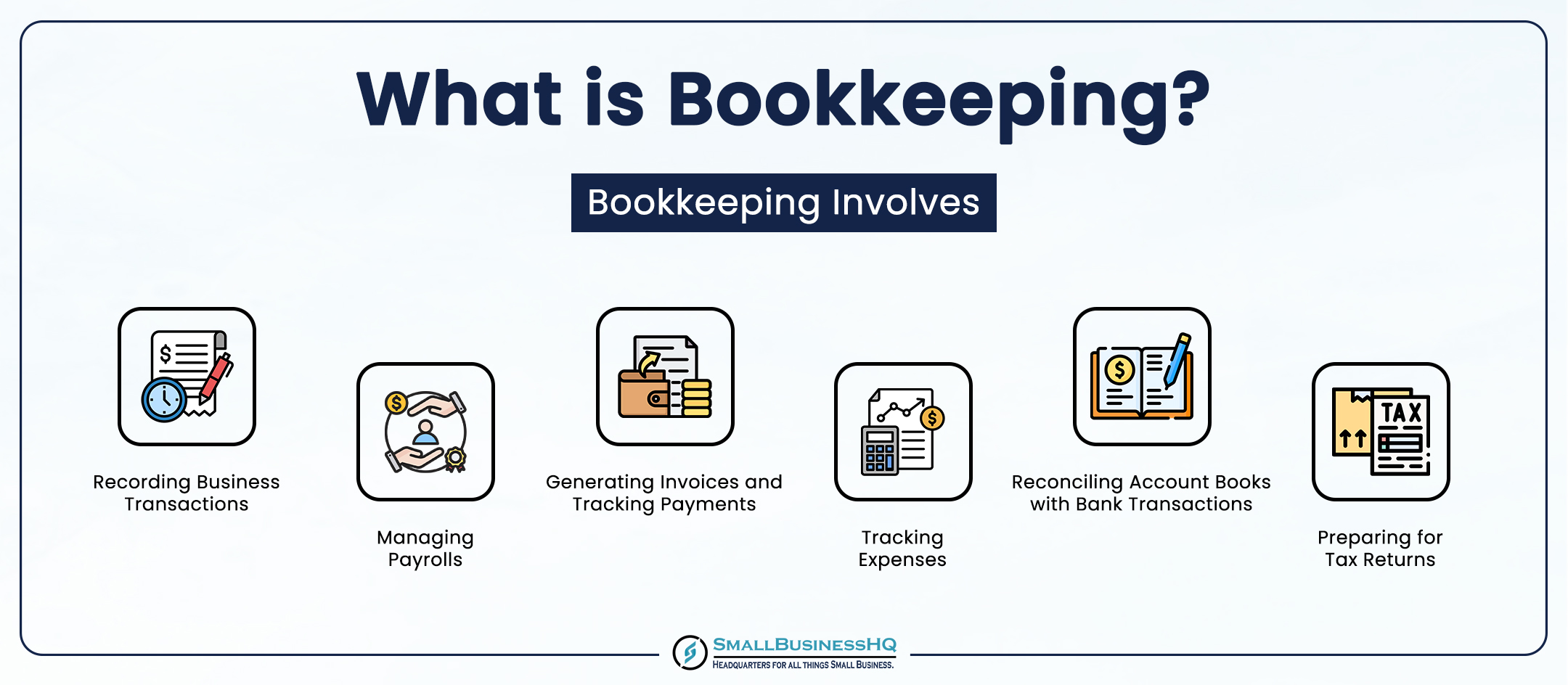How Bookkeeping Services Calgary help reduce accounting stress
Exploring the Trick Obligations of a Professional Bookkeeper in Money
The role of an expert accountant is basic in the domain name of financing. They are entrusted with preserving exact economic records, taking care of accounts payable and receivable, and guaranteeing compliance with economic laws. Additionally, their responsibility includes preparing economic declarations and records. Each of these obligations adds to the economic wellness of a company. However, the subtleties of their job often go unnoticed, raising inquiries about the influence of their know-how on broader economic approaches.
Keeping Accurate Financial Records
Preserving accurate monetary documents is an important duty for professional bookkeepers. This job needs thorough attention to information and a detailed understanding of monetary concepts. Bookkeepers are liable for recording all financial transactions, ensuring that information is videotaped regularly and precisely. They make use of numerous bookkeeping software program and tools to enhance the recording process, which boosts performance and lowers the risk of errors.
Regular reconciliation of accounts is essential, allowing accountants to recognize inconsistencies and fix them quickly. By preserving arranged and up-to-date records, they give beneficial understandings right into the economic health and wellness of an organization. This duty likewise includes the preparation of financial statements, which function as a significant source for monitoring decision-making. Eventually, the accurate financial records maintained by bookkeepers support compliance with regulatory needs and foster trust amongst stakeholders, consequently adding to the overall success of the company.

Taking Care Of Accounts Payable and Receivable
Effectively taking care of accounts payable and receivable is a crucial aspect of an accountant's role, ensuring that an organization's cash circulation continues to be healthy. This responsibility entails tracking inbound and outward bound settlements, which enables timely billing and collections from clients while additionally assuring that the organization satisfies its monetary responsibilities to vendors and suppliers.
Accountants must preserve precise documents of invoices, repayment terms, and due days, assisting in effective interaction with creditors and consumers. By monitoring these accounts, they can determine discrepancies or past due accounts, allowing positive actions to fix problems prior to they rise.
In addition, an accountant's duty consists of fixing up accounts to assure that all monetary deals align with financial institution declarations and interior records. This diligence not only improves financial openness but also supports calculated monetary planning, enabling the organization to assign sources successfully and maintain a durable financial setting.
Guaranteeing Conformity With Financial Rules
While guiding via the facility landscape of financial regulations, an accountant plays a necessary role in making certain a company abides by legal criteria and standards. This responsibility consists of staying upgraded on adjustments in tax regulations, conformity requirements, and industry-specific policies. Bookkeeper Calgary. By carefully tracking financial deals and maintaining precise records, the accountant aids stop violations that could bring about fines or lawful issues
In addition, the accountant keeps an eye on inner controls to secure against scams and mismanagement. They implement procedures that advertise openness and accountability within the economic framework of the company. Cooperation with auditors and regulative bodies further solidifies conformity initiatives, as accountants offer essential documentation and support throughout reviews.
Inevitably, the dedication to conformity not only secures the organization however likewise enhances its reliability with stakeholders, cultivating trust fund and security in its economic techniques.
Preparing Financial Statements and Reports
Preparing monetary statements and reports is an essential task for accountants, as it supplies stakeholders with a clear review of a company's financial health. Bookkeeping Services Calgary. These papers, which normally include the balance sheet, revenue statement, and money circulation statement, summarize the economic tasks and position of the company over a details duration. Bookkeepers diligently collect, document, and organize economic data to guarantee precision and compliance with suitable audit criteria
The prep work procedure includes fixing up accounts, validating transactions, and readjusting entries as required. With this extensive technique, bookkeepers aid ensure that monetary declarations show the real state of the company's finances. Furthermore, timely prep work of these reports is crucial for effective decision-making by management, investors, and regulative bodies. By offering exact and clear economic documentation, bookkeepers play an important role in preserving transparency and count on within the monetary this page ecological community of the organization.
Giving Financial Insights and Analysis
Bookkeepers evaluate financial data to supply important understandings that inform critical decision-making within a company. By diligently evaluating fads in revenue, expenses, and money flow, they aid recognize locations for improvement and highlight prospective threats. Best Bookkeeper Calgary. These insights allow administration to assign resources a lot more effectively and readjust company approaches accordingly

By leveraging economic software application and analytical devices, bookkeepers can present information in a clear and understandable style, making this article it easier for decision-makers to realize complex financial concerns. Inevitably, the understandings stemmed from a bookkeeper's evaluation equip companies to make informed options that improve success and drive development.
Often Asked Questions
What Software Tools Do Specialist Accountants Typically Use?
Expert bookkeepers usually utilize software devices such as copyright, Xero, Sage, and FreshBooks. These applications enhance financial administration, facilitate precise record-keeping, and boost reporting capabilities, permitting for effective handling of financial deals and information evaluation.
How Does a Bookkeeper Differ From an Accountant?
An accountant largely manages everyday economic purchases and record-keeping, while an accountant evaluates monetary information, prepares statements, and uses critical suggestions. Their functions match each other however concentrate on distinctive aspects of monetary administration.
What Certifications Are Called For to Come To Be an Accountant?
To become an accountant, people generally call for a high school diploma, proficiency in accounting software program, and understanding of standard bookkeeping principles. Some might seek certifications or associate degrees to boost their qualifications and work prospects.
Exactly How Commonly Should Financial Records Be Upgraded?
Financial documents ought to be upgraded routinely, ideally on a everyday or weekly basis, to assure accuracy and timeliness. This method permits effective tracking of economic activities and supports educated decision-making within the organization.
Can a Bookkeeper Help With Tax Obligation Prep Work?
Yes, an accountant can aid with tax prep work by organizing monetary records, making certain precise documents, and giving essential records. Their expertise aids streamline the procedure, making it simpler for tax specialists to total returns effectively.
They are entrusted with maintaining exact monetary documents, taking care of accounts payable and receivable, and guaranteeing compliance with economic policies. Preparing financial declarations and records is an important task for accountants, as it gives stakeholders with a clear summary of an organization's monetary wellness. Homepage With this comprehensive strategy, accountants aid ensure that economic statements show the true state of the company's finances. By leveraging economic software application and logical tools, bookkeepers can provide data in a comprehensible and clear layout, making it easier for decision-makers to comprehend complicated monetary concerns. A bookkeeper primarily manages daily financial transactions and record-keeping, while an accountant assesses financial data, prepares statements, and uses calculated advice.